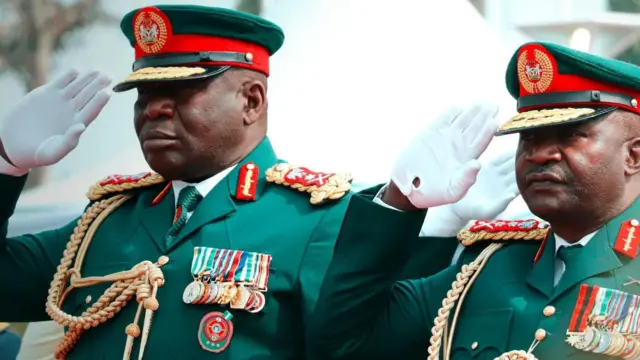The Nigerian military is currently conducting a widespread internal operation following concerns about potential disloyalty.
Two officers linked to whispers of a conspiracy to undermine the democratic government have now vanished. Authorities suspect they may have already left the country.
More than 30 personnel are currently detained as the investigation intensifies. Despite the rising number of arrests, military officials insist the action is merely a measure to enforce internal discipline, not to counter an active takeover plot.
The dramatic sweep began in early October with the initial detention of 16 individuals. Tips gathered during these interrogations caused the arrest count to swell. While officials identified 18 targets, the two officers slipped away just as the clampdown began.
The Fugitives: Two Officers Elude Detention
Authorities have publicly named the two military personnel who escaped the dragnet.
Major J.M. Ganaks (N/14363), an alumnus of the Nigerian Defence Academy’s 58th Regular Course, hails from the Federal Capital Territory. He was last posted to Jaji, a central army training area in Kaduna State.
Captain G. Binuga (N/167722), an alumnus of the 64th Regular Course, is from Taraba State. He was tied to the Defence Headquarters Special Operations Forces in Bida, Niger State.
Sources suggest both officers successfully fled abroad, avoiding immediate custody.
Inside the Detention Cells
The initial group of 16 detainees included personnel from various services. Fourteen were Army veterans, primarily foot soldiers from the Infantry Corps. The group also included one Signals specialist and one Ordnance expert.
Furthermore, one Lieutenant Commander from the Navy and one Squadron Leader from the Air Force were among those held.
The ranks of those currently detained range widely. The group includes one Brigadier General, one Colonel, four Lieutenant Colonels, five Majors, two Captains, and one Lieutenant. Officials state that information extracted from some detainees is fueling the fresh arrests, while others remain uncooperative.
Official Stance: ‘Internal Housekeeping’
Defence Headquarters has adopted a calm posture regarding the incident. Spokespersons describe the situation as “internal housekeeping” designed to address disciplinary breaches, not an attempt to thwart an impending coup.
They attribute the underlying discontent to grievances such as stalled promotions caused by failed military examinations.
Nonetheless, rumors of a plot circulated for several weeks, escalating public fears. President Bola Tinubu reshuffled his service chiefs shortly before the detentions became public. This timing has led to speculation about whether the shake-up was a coincidence or a preemptive cleanup effort.
Both the government and the military have definitively rejected the takeover allegations, stressing that democracy is secure. The first arrests were confirmed to have taken place in the first week of October, contrary to social media chatter suggesting they began on Independence Day.
Echoes of Broader Instability
Nigeria’s Armed Forces are heavily strained, engaged in ongoing battles against separatist groups, bandits, and insurgents. Issues like delayed wages and poor working conditions are known to fuel internal resentment.
The investigation has even reached into politics, with one former southern state governor reportedly facing scrutiny over alleged ties to the plot.
Analysts suggest the situation is more complex than mere “indiscipline.” The high ranks of some detainees and the seriousness of the underlying suspicion demand greater transparency.
The public is demanding names and detailed facts. The key questions remain: Is this a genuine national security threat or a side-effect of strained barracks? Will the fugitives be tracked down and returned?
READ ALSO: Cash Crisis: Experts Urge CBN to Launch N10,000 and N20,000 Notes






